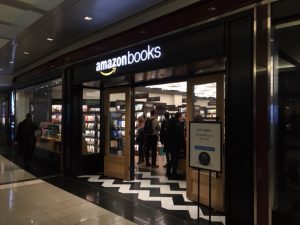
It is ironic, and for some it may seem odd, that in the midst of decades of brick-and-mortar bookstores closing their doors, a hugely successful e-tailer like Amazon would decide to venture into the concrete bookstore business with Amazon Books. Or is it?
I have seen the demise of Borders/Waldenbooks, Joseph Beth Booksellers, and the rise and fall of Barnes & Noble stores; the feuds between the independents and the chains when wonderful stores like BookPeople in Austin, TX thought they were doomed; when Costco and other giant stores started selling large quantities of bestsellers at deep discounts, perhaps underselling the competition; and the power of e-commerce, with Amazon presiding over the field. Every change in the book business makes the publishing community anxious. Clearly, with some businesses succeeding and others failing, there is a need to be able to roll with the punches. But perhaps if we take a wide angle view of things we might be able to hold onto a few constants that will create paths of opportunity and assure people that although some things look different, the basic precepts of the marketplace and sales still prevail.
- Brick-and-mortar bookstores are not dying. Yes, chains like Borders are long gone and Barnes & Noble may not be able to support a store every ten miles, but independents are going strong. According to this article on Quartz, between 2009 and 2015 the number of independent bookstores increased by 35%.
- E-book sales are falling flat. Many sources have been reporting that e-books are falling out of their previous favor. Let’s face it, devices may be convenient but they have their issues. Batteries lose their charge and if you don’t have an active WiFi connection you can’t download a new book whenever you want one. And, if you are reading for content, it’s very difficult to highlight sections and go back to them in the same manner as you would mark or dog-ear a page you need to reference later.
- Selling in person is better than selling online. I attribute this principle to the increase in the success of independents over the past several years. Real readers, who actually support the majority of the book business front and back list, like to be able to browse and get recommendations for books. They also like to hang out with other like-minded individuals. The innovations in indie stores that now offer seating, coffee, parties, and more, have brought customers in and kept this business sector alive.
- Amazon Books, while competing in bookstore form, is not doing things like everyone else. Amazon became a huge success online, and it makes sense that it would not try to duplicate what others have already done on the ground. Why should it? I recently visited one of their Amazon Books stores, and it was not like most of the ones I frequent. As a reader, I probably wouldn’t shop there on a regular basis. The main reason was that there was a smaller number of titles available. For indie presses and authors this was a benefit because the inventory was a more curated list that covered the usual suspects but also featured books from unknown publishers. And, because curating titles meant that additional shelf space was available, the books were primarily face out, which can be a boon for publishers without a lot of marketing dollars to spend. I could also forgo the other products that the store had for sale, like coffee makers and gadgets. These things diluted the atmosphere and were a distraction.
I got the distinct impression that the Amazon Books location was trying to market to Millennials, which is a big “buzz” word for everyone in any industry these days. The funny thing is that I meet a lot of younger people who fit this bill, and the ones I know who are real readers prefer the same traditional bookstores I’ve loved forever. Maybe rather than believing we need to rethink everything we’ve ever known in this business because of change, we should try to anticipate, adapt, and remind people of the core elements of books and buying books that many people share. It might eliminate some of the hysteria so we can all get back to business (and reading of course).
Have you been to an Amazon Books? Tell us your thoughts on Twitter.

 When indie or self-published authors are releasing their new novels they always shoot for the brass ring: a review or feature in/on The New York Times, USA Today, The Today Show. When it comes to readings and merchandising of their books, they ask about the bookstores that they love: McNally Jackson’s, Politics & Prose, Powell’s, and of course, Barnes & Noble.
When indie or self-published authors are releasing their new novels they always shoot for the brass ring: a review or feature in/on The New York Times, USA Today, The Today Show. When it comes to readings and merchandising of their books, they ask about the bookstores that they love: McNally Jackson’s, Politics & Prose, Powell’s, and of course, Barnes & Noble.